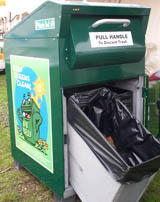
I've been getting an uneasy feeling lately.
As American Christians, we claim to love the people of the world, yet we don't even seem to notice when they are dying.
There have been a lot of headlines lately when the US casualty count in Iraq hit 2000, but has anyone noticed that the civilian body count has hit an estimated 25,000?
Everywhere you turn, there are fundraisers for those impacted by Katrina. That is appropriate -- I've gladly contributed myself, and it makes sense that we should take care of our own people.
But here's my question: what about the people who are suffering from the earthquake in Pakistan? It's not even mentioned on most news programs any more. No one really knows how many have died. Some say 55,000. Some say 80,000, but no one really knows, partly because half a million people have not received ANY aid because no one has even reached them yet and the dead have not been counted.
 People are dying daily from preventable diseases, such as tetanus. 3 million are without food and shelter, and winter is setting in. Due to the combined effect of the mountainous area and the roads destroyed by the earthquake, the only hope for many of these people is via helicopter, which frankly is going to require international donations both of cash and of equipment. This isn't yet a reconstruction effort, it is still a critical rescue phase. It's too late for the people who are buried, but it's not to late for many of the injured and homeless, if they are rescued before they have gangrene, and before they freeze to death, and before they starve.
People are dying daily from preventable diseases, such as tetanus. 3 million are without food and shelter, and winter is setting in. Due to the combined effect of the mountainous area and the roads destroyed by the earthquake, the only hope for many of these people is via helicopter, which frankly is going to require international donations both of cash and of equipment. This isn't yet a reconstruction effort, it is still a critical rescue phase. It's too late for the people who are buried, but it's not to late for many of the injured and homeless, if they are rescued before they have gangrene, and before they freeze to death, and before they starve. Save a life today. Donate to World Vision, or to another agency that is on the scene.
But now that I've said the serious stuff, I'll mention a funny aside. In a peculiar twist of fate, I actually know the prime minister of Pakistan (not that he would remember me). Several years ago we worked together on the same computer project. I can't quite recall whether I taught him how to make his own coffee. That was before he was prime minister, of course.


